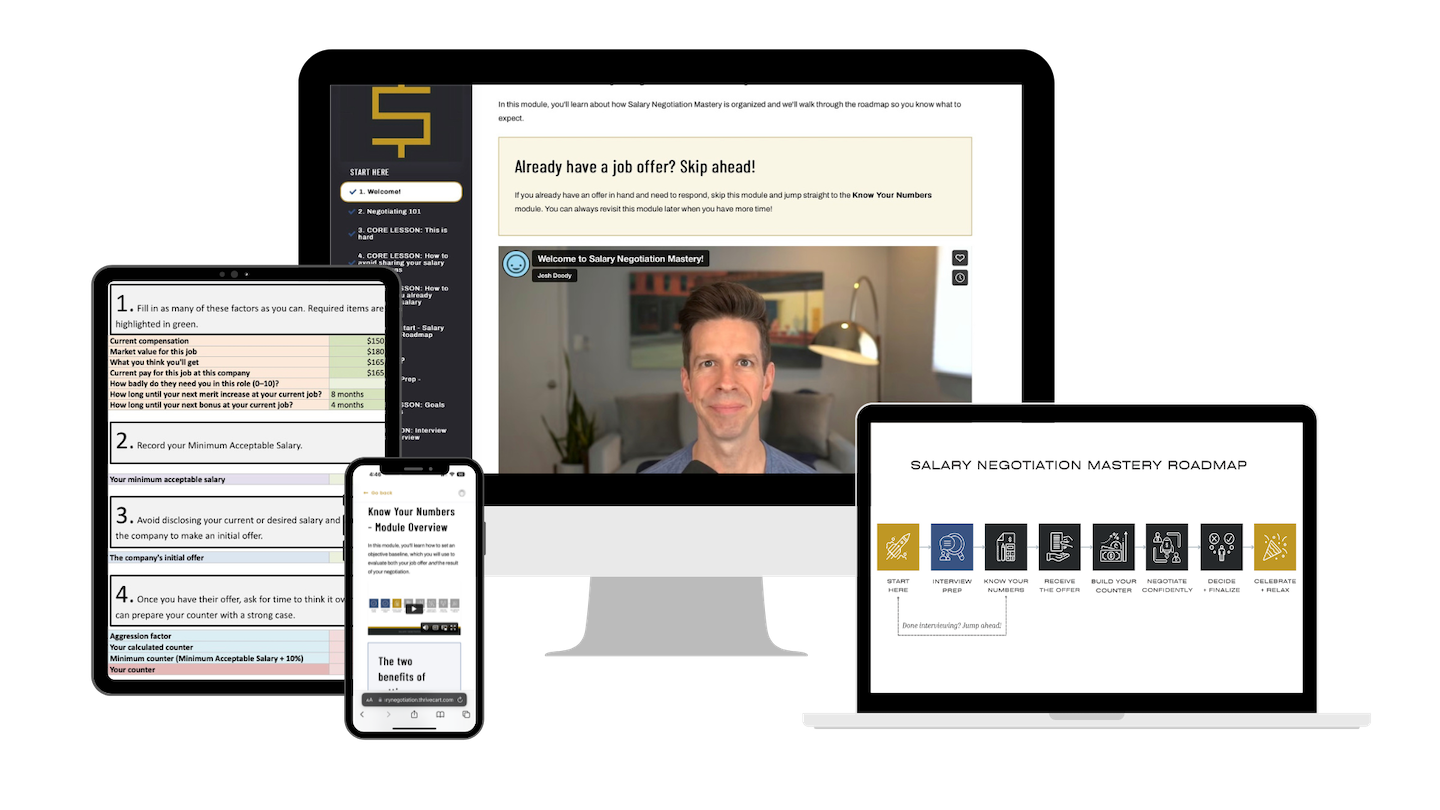Negotiating job offers
Counter Offer Calculator
Quickly calculate the right counter offer for your job offer
by Josh Doody
You should negotiate starting salary rather than just accepting the first job offer you get. Why?
If you negotiate a $5,000 increase, you will make $5,000 more the first year at your new job. And you will make $5,000 the next year, and the next year, and the next year. Over 20 years, that $5,000 salary increase would be worth more than $100,000. Negotiating starting salary at a new company is one of the best opportunities to get this sort of increase or even more.
A counter offer calculator you can use to negotiate starting salary
The Fearless Salary Negotiation method is easy to use while generating phenomenal results. It’s so easy, I summarized it on this single page.
How does it work?
- Calculate your counter offer. The counter offer calculator accounts for four factors—the base salary of your job offer, your minimum acceptable salary (“walk away” number), how badly the company needs you to accept the job offer, and how badly you need the job.
- Email your counter offer. Learn how to write your salary negotiation email with this guide.
- Prepare for your final discussion. Use the salary negotiation script example as your guide.
You’re less than 1 minute away from having a complete salary negotiation script to successfully negotiate starting salary!
Learn more Get valuable tips to negotiate your job offer without endangering the opportunity or leaving anything on the table
How to negotiate salary: 9 tips from a pro salary negotiator
1. Calculate your counter offer
Let’s start with your counter offer. The most common salary negotiation mistake is to not negotiate. All you need to negotiate is a counter offer.
What's the base salary component of your offer? We'll focus on base salary first because that's the gift that keeps on giving year after year!
How badly do they need you to accept the job offer? (0–10) What's your sense of how badly they specifically need you to fill this particular position?
How badly do you need the job? (0–10) How desperate are you to get the job?
What's your minimum acceptable salary? What's the absolute minimum base salary you must get to accept this job? Tell me more...
(Optional) What non-salary benefits do you prefer once your base salary is maximized? List up to three benefits—most important is first.
2. Email your counter offer
Now that you have your counter offer calculated, send it to the recruiter or hiring manager.
If possible, send your counter offer in an email. Why? So that you can also make your case to justify your counter offer and so your written case can be circulated internally at the company if they need to discuss it.
“That sounds easy enough, but do you have a salary negotiation counter offer letter sample I can use to get started?”
As a matter of fact, I do!
3. Prepare for your final discussion
Once you’ve counter offered, the company will probably respond with something between the base salary of your job offer and your counter offer. That’s your salary negotiation window. Your goal is to maximize your salary within that window.
Let’s say the company made a job offer of $50,000, and your counter offer is $56,000. Your salary negotiation window is now $50,000–$56,000.
Break your salary negotiation window into increments. Each increment represents a possible response the company might make to your counter offer.
For each increment, plan your response. First, you’ll work to maximize your starting salary. Your minimum acceptable salary is $52,000, so you will not take the job for less than that amount.
Once you’ve maximized your starting salary, then pursue additional benefits that are important to you, starting with the most important benefit.
- Extra week of vacation
- Signing bonus
- Work from home
Here’s a salary negotiation script example you can use to plan for your salary negotiation: Salary negotiation script example

